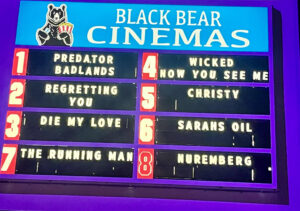If you found yourself on the University of Maine mall around noon on Oct. 3, you would have encountered a sea of tote bags, matchas and Labubus. These items belonged to the contestants of Triota’s fundraising competition, the winner of which became “UMaine’s Ultimate Performative Masc.” Surrounding them was a lively crowd listening to the statements of each contestant of how they were the top performative masc present.
But what does it mean to be a performative masc? That all depends on who you ask. To some it means a man who has curated his image based on the female gaze in order to gain such attention. As Charlie Thrush wrote for Block Club Chicago a “performative male is a man with traditionally feminine hobbies with the sole intent of cultivating an inauthentic aesthetic that might appeal to progressive women.” Popularly, this entails sporting swag such as a thrifted outfit, recycled tote bag and perhaps a book on feminism that really conveys a sense of this person being in touch with their emotions and keen on empowering women.
After the testimonials of each participant, the hosts, including Casper Cowan, elected three of their favorites to be voted on by the audience. By a show of clapping and hollering Sasha Rapoport was selected as the winner.
When asked what it means to be a performative “masc,” Rapoport said: “Well, I’m a performative masc, but a performative male does this just to get women. A performative masc does this because this is what’s in her heart, which she believes is right. A performative male does this just because they want p*ssy, right? But a performative masc is doing this purely because they want to better the world of all lesbians around them.”
This statement brings even more nuance to the situation; what’s the difference between a performative male and a performative masc? Well, according to Rapoport, it is all about intention. A performative male doesn’t care about actually empowering women, but rather tricking women into liking them. As Mahalie Chang stated for GQ magazine, a performative male “is doing his mating dance, puffing out his feathers, in pursuit of female attention.” In contrast, according to our winner, a performative masc is there to support women without ulterior motives.
The controversy doesn’t end there. Inherent to this topic is a discussion on morality and sustainably. A must-have for many performative individuals is their trusty Labubu: a popular stuffed animal keychain sold by Popmart, a Chinese toy company. However, critics argue that these toys miss the mark on being performative.
“I think I won maybe because of my anti-Labubu speech, because I am a marine science major, and I care for the environment,” said Rapoport.
They are referencing the fact that the making of Labubus not only involves unsustainable materials and international shipping methods, but is made by a company that workers complain doesn’t uphold basic human rights. In a review posted on Indeed an ex-employee wrote: “This company, unfortunately, falls short of providing a satisfactory work environment. While the colleagues are friendly and supportive, numerous challenges persist … Violations of labor laws, card revocations, and inadequate communication about overtime further contribute to an unfavorable work atmosphere.”
On Glassdoor, another popular job search website, the company boasts a 2.3 out of 5 star rating. Comments under this include “wrongful termination and hostile work environment,” “overworked and underappreciated,” and “poor management and employee treatment.”
So, being a performative male was never about truly caring about progressive causes, but rather giving the air that you do. But maybe this competition was no different. After all, the voting wasn’t totally up to the students. The flyer suggested that the winner would be “UMaine’s Ultimate Performative Masc,” yet the winner was chosen through a nomination process, a not-so-democratic method. To better understand the nuance of this situation, students in the audience were asked how they felt about the way in which the winner was decided.
“I think it kind of sucked a little bit. I was coming here thinking that audience participation mattered a little bit more because like I said, I think a lot of people didn’t get the chance to be in the top three who should have been,” said Abby Caruso, international affairs student at UMaine.
To see what the participants thought, the winner was asked their thoughts. “I say we should have let all the people in the crowd vote, but I understand it could have been a little hectic. I think the organizers did the best they could, but maybe if this is an annual thing, maybe next year we can involve the crowd a little bit more,” said Rapoport.
A number of students did not find the voting very democratic, making this event no less performative than the masc who won. Yet, perhaps that’s the very point. As Alex Michaelides astutely put in his book The Fury, “I often think life is just a performance. None of this is real. It’s a pretense at reality, that’s all. Only when someone, or something, we love dies, do we wake up from the play — and see how artificial it all is — this constructed reality we inhabit.”
And I think even more punctually did one of the student audience members capture this theme; “I don’t know if it was that fair, but at the end of the day, it is a performative male contest, so does it really matter? No,” said Mazy Karuzis, environmental science student at UMaine.
So maybe, after all this, the true winners of the performative masc competition were those who are able to come to such an event and simply enjoy the inherent beauty of the unseriousness of life.










